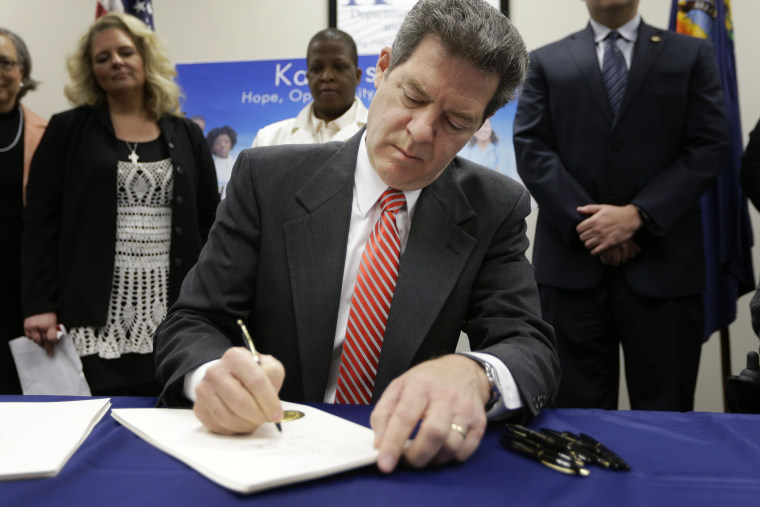If the
spectacular failures of Kansas Gov. Sam Brownback's (R) economic experiment, and the ensuing budget crisis, were the only stories dominating the state, it would be more than enough to put the Sunflower State on national front pages.
But recent developments in Kansas go much, much further. Consider this
New York Times report from the weekend:
The fight between Gov. Sam Brownback of Kansas and the state's judicial branch has escalated, with the governor last week signing into law a bill that could strip state courts of their funding. The measure, at the end of a lengthy bill that allocated money for the judiciary this year, stipulates that if a state court strikes down a 2014 law that removed some powers from the State Supreme Court, the judiciary will lose its funding.
Think about that for a minute. Elected state officials in the Republican-led capital want state courts to endorse a policy on the makeup and budget of Kansas courts. But before the judges decide, those same officials have said the courts' funding hangs in the balance.
As Rachel noted on the show two weeks ago, before Brownback signed the measure late last week, "'You rule one way, you're fine. You rule the other way, we will abolish the courts.' So go ahead and consider that case, Kansas judges. Enjoy your judicial independence."
And just when it seemed conditions in Kansas couldn't become more politically absurd, Brownback found yet another way to push the envelope. TPM
reported late last week on the Republican governor's plan to expand Secretary of State Kris Kobach's (R) authority "to prosecute voter fraud cases."
If Brownback does sign the legislation, which has already passed both chambers of the state legislature, Kobach would be given the power to prosecute voter fraud cases even when, according to critics, local prosecutors had opted against moving forward with those cases. Kobach is a prominent figure in conservative "voter fraud" circles, loudly declaring that voter fraud is rampant and pushing new laws that have the effect of restricting access to voting, especially among voters who tend to favor Democrats. Voting experts, on the other hand, point to studies that show voter fraud is relatively rare with negligible impact on election outcomes. "I very much worry about Kobach getting additional prosecutorial authority, as he seems to be someone who is willing to make false or exaggerated claims of voter fraud to fit his political narrative," election law expert Rich Hasen told TPM in an email.
Under the existing system, if the Kansas Secretary of State's office finds evidence of voter fraud -- or more accurately, evidence that the Secretary of State thinks might be voter fraud -- it's supposed to be turned over to local prosecutors for an investigation and possible criminal charges.
Brownback and GOP state lawmakers want to streamline the process -- if the Kansas Secretary of State's office uncovers possible voter fraud, the governor will have effectively deputized Kobach into a law-enforcement role, allowing him to pursue charges whenever he feels like it.
According to the
Wichita Eagle, Brownback is
expected to sign the measure into law today.
Given Kobach's track record, this is truly ridiculous news. The Republican Secretary of State, you may recall, engaged in
outrageous antics during last fall's U.S. Senate race in Kansas, which only added to his reputation as a pioneer in
voter-suppression tactics.
More recently, Kobach publicly chastised U.S. Attorney Barry Grissom, complaining to the media that the Secretary of State's office had referred examples of voter fraud to the Kansas-based federal prosecutor, but Grissom has refused to prosecute. Worse, Kobach said the U.S. Attorney didn't "know what he's talking about" when Grissom said voter fraud doesn't exist in Kansas.
Kobach was later
proven to have lied shamelessly about the whole thing. Brownback now intends to reward Kobach's dishonesty with prosecutorial power, addressing crimes that don't exist.
Kansas has long been a red state, but it had a tradition of pragmatic, mainstream Republicans who were committed to responsible governance. Those Republicans were targeted, eliminated, and replaced with the radical GOP officials running the show now.
It'll probably be a long while before the state recovers.
